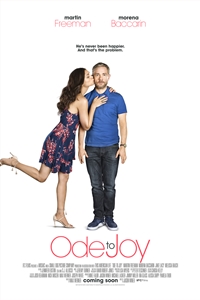Ode to Joy (R) ★★
 According to Wikipedia, cataplexy (a form of narcolepsy) "is a sudden and transient episode of muscle weakness accompanied by full conscious awareness, typically triggered by emotions such as laughing, crying, or terror." Charlie (Martin Freeman), the main character in Jason Winer's Ode to Joy, suffers from this condition. The film's depiction of cataplexy is a reasonable representation considering how it's being used (sufferers may understandably disagree). It's too bad that so many of the screenplay's other elements - like its treatment of basic human emotions - are badly mishandled.
According to Wikipedia, cataplexy (a form of narcolepsy) "is a sudden and transient episode of muscle weakness accompanied by full conscious awareness, typically triggered by emotions such as laughing, crying, or terror." Charlie (Martin Freeman), the main character in Jason Winer's Ode to Joy, suffers from this condition. The film's depiction of cataplexy is a reasonable representation considering how it's being used (sufferers may understandably disagree). It's too bad that so many of the screenplay's other elements - like its treatment of basic human emotions - are badly mishandled.
Ode to Joy is a romantic comedy so, almost by definition, there must be a meet-cute. That critical moment won't rank alongside the greats in the genre. Charlie, a master of defusing tense situations (because the cataplexy requires him to remain even-keel and avoid things like happiness at all costs), prevents a distraught young woman, Francesca (Morena Baccarin), from doing serious bodily harm to her boyfriend, who has just dumped her. Charlie and Francesca are drawn to one another and, against his better judgment, he agrees to go out on a date with her. It doesn't end well - he gets overexcited, passes out, hits his head, and wakes up in the hospital. At that point, he decides that continuing to see Francesca is a bad idea for them both.
As rom-com setups go, this one is adequate and there's decent chemistry between the buttoned-down Martin Freeman and the flamboyant, vivacious Morena Baccarin. Critics are frequently cautioned to review the movie they see, not the one they wish they had seen but it's impossible to ignore the road not taken in Ode to Joy. This could have been an engaging movie about a couple struggling to find their romantic footing while hampered by Charlie's condition. Instead, however, director Jason Winer (the Arthur remake) and screenwriter Max Werner decide that the best way to proceed is by giving Charlie and Francesca different partners, keeping them together via plot contortions, and seeing if they can find their way back to one another.
Charlie decides that his younger brother and occasional wingman, Cooper (Jake Lacy), should date his would-be true love. Francesca, meanwhile, nominates the dour, emotionally stunted Bethany (Melissa Rauch), as being perfect for Charlie. The two mismatched couples go through the motions for about 45 minutes before the inevitable happens. It might not be so painful if Cooper wasn't insufferable and Bethany wasn't boring but both characters are unappealing and their constant, grating presence makes half of Ode to Joy a slog. During that interminable portion of the movie when the partners are Cooper/Francesca and Charlie/Bethany, the only time it has a pulse are the scenes when Charlie and Francesca find a few moments together.
Sadly, the cataplexy, instead of being an important cog in the romantic dynamic, becomes a plot device. There's a cute epilogue that hints at what the movie could have been had it shown the courage to fully invest in the Charlie/Francesca relationship. Instead, by doubling down on the dumb "romantic complications" aspect of the story, it not only deprives viewers of an opportunity to see real development in Charlie and Francesca's romance but neuters the fantasy that rom-com lovers enjoy. Instead of being a song to lift the heart, Ode to Joy is a discordant, off-key tune that lasts too long.
© 2019 James Berardinelli
To get the full Quicklook Films experience, uncheck "Enable on this Site" from Adblock Plus
box office top 10

Civil War Released: April 12, 2024 Cast: Kirsten Dunst, Wagner Moura 25.7M

Godzilla x Kong: The New Empire Released: March 29, 2024 Cast: Rebecca Hall, Brian Tyree Henry 15.5M

Ghostbusters: Frozen Empire Released: March 22, 2024 Cast: Paul Rudd, Carrie Coon 5.8M

Kung Fu Panda 4 Released: March 8, 2024 Cast: Jack Black, Viola Davis 5.5M

Dune: Part Two Released: March 1, 2024 Cast: Timothée Chalamet, Rebecca Ferguson 4.3M

Monkey Man Released: April 5, 2024 Cast: Dev Patel, Sikandar Kher 4.1M

The First Omen Released: April 5, 2024 Cast: Nell Tiger Free, Bill Nighy 3.8M

The Long Game Released: April 12, 2024 Cast: Dennis Quaid, Gillian Vigman 1.4M

Shrek 2 Released: May 19, 2004 Cast: Mike Myers, Eddie Murphy 1.4M

Sting Released: April 12, 2024 Cast: Alyla Browne, Ryan Corr 1.2M






